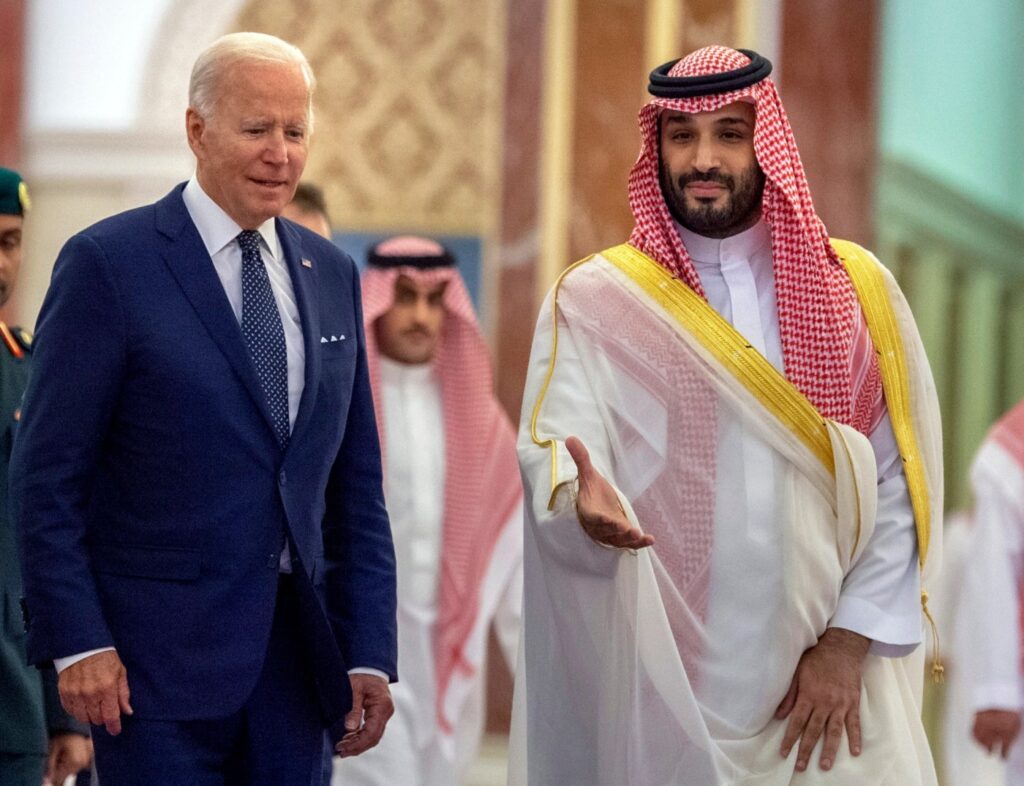
Nation-states can bloviate all they like in their diplomatic rhetoric about the importance and even joys of long-term friendship with key allies, but in the end it all comes down to strategic relationships — and to money.
A case in point is certainly the United States’ relationship with Saudi Arabia. Still a very young nation in historical terms, forged out of an alliance of desert tribes behind the leaders of the Saud family only in the early 20th century, the bond between the kingdom and the U.S. was solidified when vast deposits of oil were discovered beneath the sands of the Arabian Peninsula and Aramco — the Arabian American Oil Company — was formed in the 1940s to exploit them. (Interestingly for Californians, the company was briefly known as California-Arabian Standard Oil Co. before that.)
When the oil pools were eventually found to be among the largest in the world, Saudi Arabia became vastly rich. Aramco is now 90% owned by the country’s sovereign wealth fund. In the last 80 years, every nation in the world has had a security — and monetary — interest in being friendly with the kingdom and its religious-monarchy rulers, no matter its transgressions regarding basic freedoms for its citizens, its funding of highly problematic wars and even terrorist activities and its hostility toward Israel.
Every American president in our time has had a diplomatic interest in friendly relations with the Saudis, though some talked at least about taking a tough stance with the kingdom when its actions cross some line.
When he was a presidential candidate, for instance, Joe Biden vowed to make Saudi Arabia a “pariah” after U.S. intelligence services said that Crown Prince Mohammed bin Salman, the kingdom’s de facto ruler, was responsible for the killing and dismemberment of Washington Post columnist Jamal Khashoggi, a Saudi citizen whose crime in the Saudis’ eyes was criticism of kingdom policies in his journalism.
That proper outlook soon disappeared once Biden took office, and he made a friendly trip to Riyadh in mid-2022, again giving legitimacy to MBS, who so recently had been dubbed “Bonesaw.” “The visit represents the triumph of realpolitik over moral outrage, according to foreign policy experts,” The New York Times reported.
Outrageously, the Biden administration continued to be quiet about the horrors inflicted by Saudi forces and money in the ongoing war in Yemen.
Now, a new report from Human Rights Watch says that border guards in Saudi Arabia have fired machine guns and launched mortars at Ethiopians trying to cross into the kingdom from Yemen, likely killing hundreds of the unarmed migrants in recent years, the Associated Press reported last week.
And it turns out — surprise — that officials in Washington quite likely have known about these killings for some time, as the AP says that reports of violence against the civilian migrants “circulated among diplomats and U.N. officials for more than a year before being thrust into wider public view.”
What is worse, for those of us with an interest in having American diplomacy retain any ethical high ground at all, is that the “U.S. Army conducted extensive training of the border guard over a span of eight years, beginning in 2015 and concluding only last month.”
Follow the money: the Saudis are United States defense contractors’ single largest customer.
Now that the killer cat is out of the bag, one State Department official has said, “we will not let up in terms of our own concern about how this has been handled and in our determination that there should be an investigation.”
That’s all well and good. But you don’t have to be unduly skeptical to wonder if such a determination would have been undertaken absent the release of the Human Rights Watch report.
“It isn’t exactly a secret that Saudi Arabia has an appalling human rights record,” Nadia Hardman, a Human Rights Watch researcher who wrote the report told the Washington Post. “This should have been a minimum requirement.”
All Americans should agree with her conclusion: “Any government providing weapons or training to foreign security forces with histories of civilian harm should insist on effective means to ensure their backing doesn’t enable illicit behavior.”
